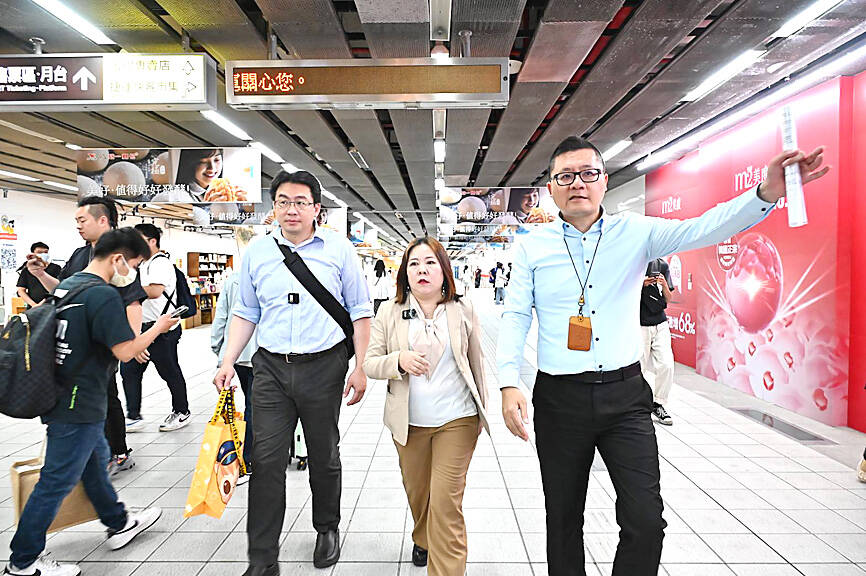The Kaohsiung Rapid Transit Corp (KRTC) has invited a Japanese rice ball vendor and his Taiwanese wife based in the city to open a stall in one of the city’s stations after a video of their landlord smashing items outside their store earned them widespread sympathy.
KRTC said it contacted the couple and offered to take them to Zuoying, Kaohsiung Main and Formosa Boulevard stations yesterday to evaluate potential sites for a stall, in what the company described as a gesture of “friendship and support between Taiwan and Japan.”
Meanwhile, Chang Yen-ching (張硯卿), head of the Kaohsiung City Department of Administrative and International Affairs, said the city is also offering the couple a spot in the cafeteria of its administrative center.

Photo: Wang Rong-hsiang, Taipei Times
The Japanese-style rice ball shop in Gushan District (鼓山), operated by a 60-year-old Japanese man surnamed Higuchi and his Taiwanese wife, received support from the public after their landlord was caught on camera knocking over and smashing items in front of the store on Friday.
Higuchi’s wife, surnamed Chang (張), on Sunday told reporters that her husband was moved to tears by the community’s response to the incident, with crowds lining up to purchase rice balls and messages of encouragement flooding in on social media.
Chang said they are still searching for a new business location and are handling court proceedings related to the dispute, which she said had caused them emotional stress and disrupted their business.
The altercation involved the 62-year-old tenant Chang and the 59-year-old landlord, surnamed Shao (邵), who accused the shopkeeper of placing items in unauthorized areas and filed a theft-related complaint, the Kaohsiung Police Department said.
The police said the couple later filed a countersuit for property damage and said that a minor injury occurred when the landlord kicked a chair that struck Higuchi.
“Shao is suspected of having been emotionally agitated, pushing over tables, chairs, flowerpots and other items,” the police said.
On Monday, Democratic Progressive Party Legislator Huang Jie (黃捷) visited the store, later writing on Facebook that the shop represented the “sincerity of Taiwan-Japan friendship.”

SHIPS, TRAINS AND AUTOMOBILES: The ministry has announced changes to varied transportation industries taking effect soon, with a number of effects for passengers Beginning next month, the post office is canceling signature upon delivery and written inquiry services for international registered small packets in accordance with the new policy of the Universal Postal Union, the Ministry of Transportation and Communications said yesterday. The new policy does not apply to packets that are to be delivered to China, the ministry said. Senders of international registered small packets would receive a NT$10 rebate on postage if the packets are sent from Jan. 1 to March 31, it added. The ministry said that three other policies are also scheduled to take effect next month. International cruise ship operators

HORROR STORIES: One victim recounted not realizing they had been stabbed and seeing people bleeding, while another recalled breaking down in tears after fleeing A man on Friday died after he tried to fight the knife-wielding suspect who went on a stabbing spree near two of Taipei’s busiest metro stations, Taipei Mayor Chiang Wan-an (蔣萬安) said. The 57-year-old man, identified by his family name, Yu (余), encountered the suspect at Exit M7 of Taipei Main Station and immediately tried to stop him, but was fatally wounded and later died, Chiang said, calling the incident “heartbreaking.” Yu’s family would receive at least NT$5 million (US$158,584) in compensation through the Taipei Rapid Transit Corp’s (TRTC) insurance coverage, he said after convening an emergency security response meeting yesterday morning. National

PLANNED: The suspect visited the crime scene before the killings, seeking information on how to access the roof, and had extensively researched a 2014 stabbing incident The suspect in a stabbing attack that killed three people and injured 11 in Taipei on Friday had planned the assault and set fires at other locations earlier in the day, law enforcement officials said yesterday. National Police Agency (NPA) Director-General Chang Jung-hsin (張榮興) said the suspect, a 27-year-old man named Chang Wen (張文), began the attacks at 3:40pm, first setting off smoke bombs on a road, damaging cars and motorbikes. Earlier, Chang Wen set fire to a rental room where he was staying on Gongyuan Road in Zhongzheng District (中正), Chang Jung-hsin said. The suspect later threw smoke grenades near two exits

The Forestry and Nature Conservation Agency yesterday launched a gift box to market honey “certified by a Formosan black bear” in appreciation of a beekeeper’s amicable interaction with a honey-thieving bear. Beekeeper Chih Ming-chen (池明鎮) in January inspected his bee farm in Hualien County’s Jhuosi Township (卓溪) and found that more than 20 beehives had been destroyed and many hives were eaten, with bear droppings and paw prints near the destroyed hives, the agency said. Chih returned to the farm to move the remaining beehives away that evening when he encountered a Formosan black bear only 20m away, the agency said. The bear